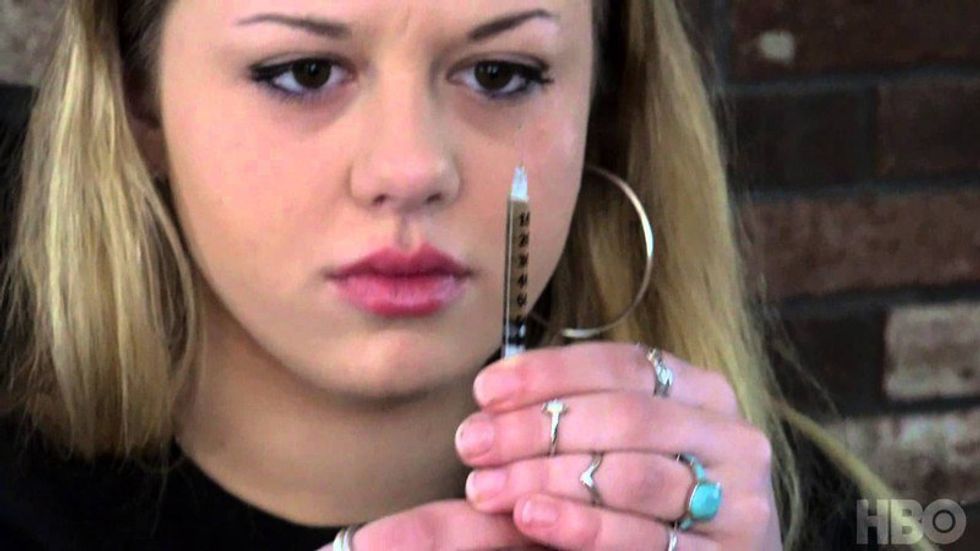Sometimes, there's only so much the evening news can tell us during a story's three-minute duration, leaving many aspects of a story out or even having to sacrifice an entire story due to time, only to have the issue presented to become worse due to the public's lack of knowledge on the subject. This is where the documentary filmmakers come in. Through the art and duration of motion pictures, filmmakers are able to record every detail of a serious story as it's happening, making viewer not only pay attention to what the documentary is trying to warn us about, but to relate to the audience on a level that can destroy the viewer's sense of safety and ignorance, with the reality of how this occurrence could happen to themselves, inspiring actual change with the problem at hand.
As the latest film to be added to HBO Documentary's already beaming list of controversial and critically acclaimed documentaries, "Heroin: Cape Cod,USA" documents the lives of men and women in their early twenties dealing with debilitating heroin addictions, as well as others affected by the enveloping epidemic of heroin and opiate abuse that has seemingly taken over the ideal Cape. Directed by Academy Award winner Steven Okazak, "Heroin" is a stark reminder of the sporadic rise in opiate and heroin abuse and death over the past two years in U.S., driven mostly by young adults ages 18-25. With this hitting the hardest in the North East and New England, the individuals shown are not the bad people from dysfunctional families that we always assumed garnered these levels of addiction, but people just like us who were raised by loving families in good neighborhoods, meaning that absolutely no one can be spared by the influence or effects of this epidemic at the ongoing rate.
The first thing this documentary accomplishes in order to raise awareness of this epidemic. In the decades prior, various Public Service Announcements and studies accused marijuana of being the 'gateway drug' that eventually leads to harder drugs like heroin. Yet as these young people tell us, and as many newer statistics tell us, the real gateway to heroin addiction happens after things like sports injuries or accidents that lead to young people still in high school being prescribed very heavy painkillers like Percocet, Vicodin, and Oxycodone. These prescription pills become so addictive to these kids that when their supply runs out and the price of individual pills increase, they are later more than willing to pick up the needle, seeing how nowadays there are some states where heroin can be easier to buy and cheaper than even a six-pack of beer. And seeing as this cycle usually starts from injuries like those in sports, its easy to see how this is happening more and more to kids known as the star-athletes rather than the teen form the wrong side of the tracks.
As far as what has caused a rise in opiate addiction to become this sporadic, the documentary links some of the rise to the Mexican Cartel, who had to increase their heroin market after losing business in the states due to the influence of marijuana legalization. The rise is also credited to different cuts of heroin that have been traveling throughout the states that are laced with painkillers like Fentanyl that not only increase the addict's high, but also increases their chances of overdosing, with the Fentanyl-laced Heroin in particular responsible for the harsh rise of heroin-related deaths across the country.
The harsh sting of this countries increase of heroin deaths plays a highly affective role in "Heroin: Cape Cod." With two of the women focused on in the documentary, revealed to have died shortly after filming at the same young age of 23, the documentary is relentless in showing how this epidemic is killing addicts at a cruelly fast rate and dragging their families along in the staggering anguish.
Much like HBO's other documentaries on drug addiction, such as Okazak's previous documentary on addiction "Black Tar Heroin: The Dark End of the Street" (1999), this latest addition is unflinching in showing the act of injecting heroin as well as the various side effects and the depressing lifestyles of those entwined in the cycle of addiction, no matter how low that subject might take them into the chasm. What makes this one so much more effective though is that even though these are drug addicts that we will never know, it feels as though we know these people and we know their families. Why? Because they are just like us, they had the same childhoods as us, they live in the same neighborhoods. Showing even more how this plague of addiction could happen to absolutely anyone. The reason why this film is something every family or young person needs to see is that with this heroin addiction hitting our country so hard, this possibility of this happening to you or one of your family members is higher than any of us could have imagined. So if you want to break this cycle and help lower the statistics, show this documentary, get the right statistics of how this cycle begins to the knowledge of the public and help bring the subject of this documentary to light before more young Americans are suffocated by the darkness of this hidden epidemic.

















